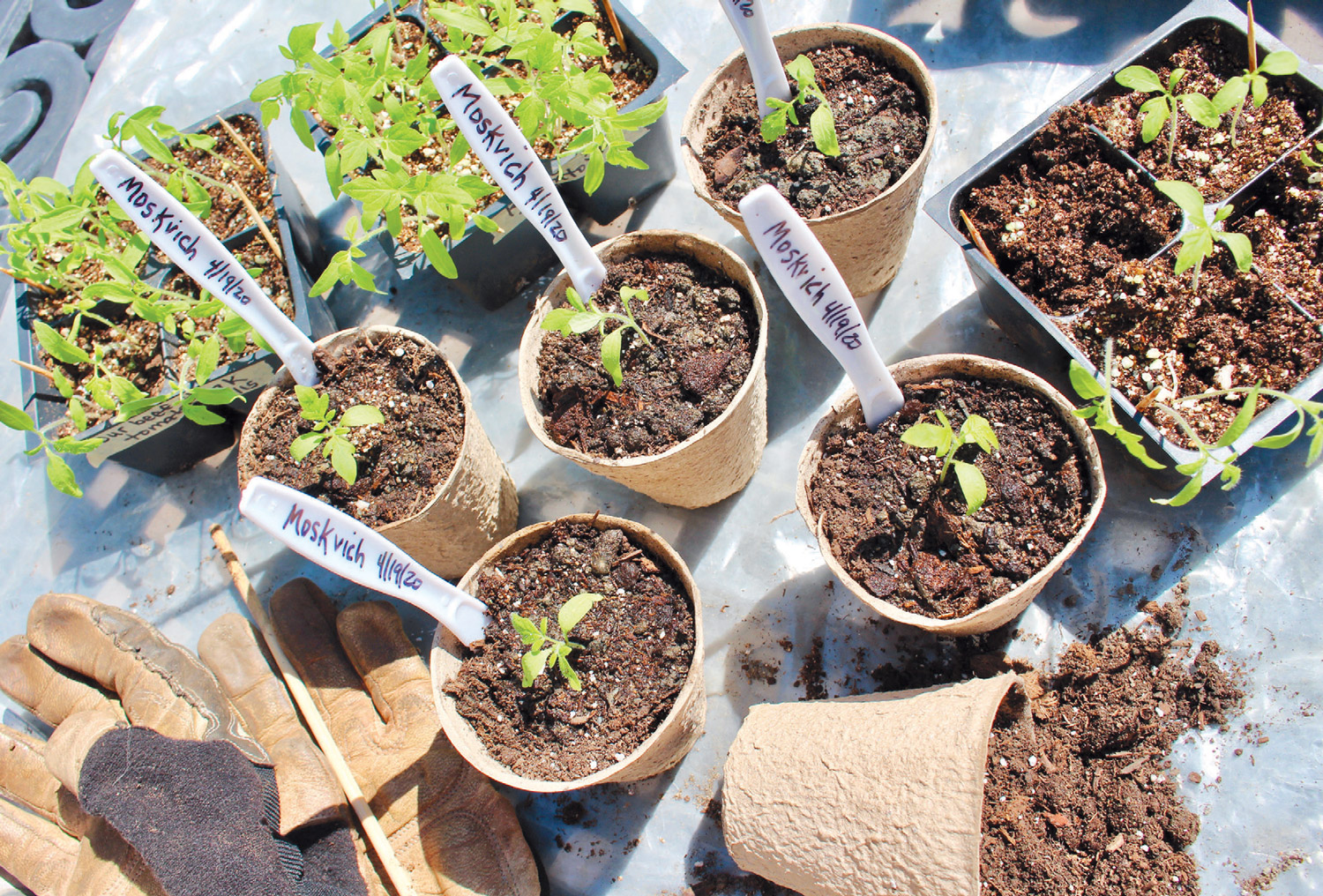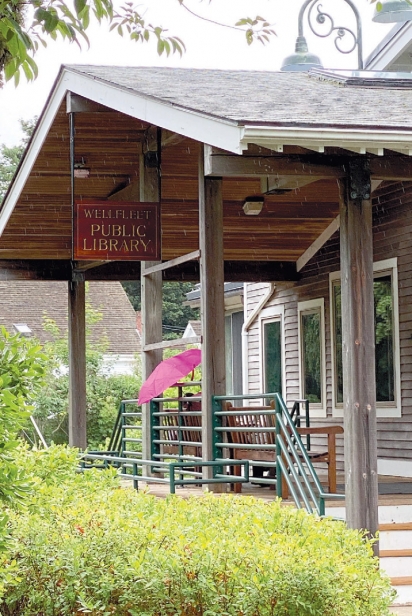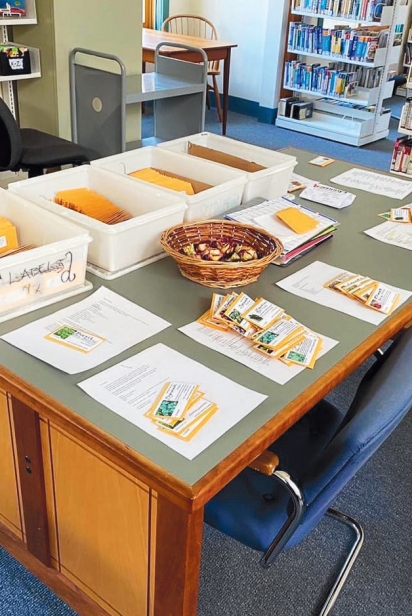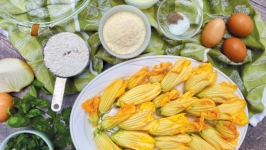The Dewey Delicious System: Wellfleet Public Seed Library
On a lazy Sunday in early March, I zipped up my coat and walked toward the Wellfleet Public Library on West Main Street. The sun was already throwing long shadows across the crowded parking lot, rogue seagulls squawked in the distance, and none of us knew that within a few short weeks, a pandemic would change our lives forever. When I walked inside, people were gathered around the circulation desk, clutching books to their chests and laughing. Others grabbed hot cups of coffee and some chocolate chip cookies that had been set up on a small table for patrons to enjoy. It was a typical scene from B.C. (before coronavirus). I was on a mission, though. At the time, I didn’t realize just how important it would be for me to check these items out. I was there to check out seeds. As in little paper envelopes filled with organic and heirloom seeds to be planted in my vegetable garden once the ground thawed.
Of all the library’s numerous community engagement and outreach programs, including those they’ve continued to run virtually since businesses were forced to close doors indefinitely due to COVID-19, the Wellfleet Public Library 2020 Seeds-by- Mail effort may be their most bountiful. According to Director Jennifer Wertkin, assistant director Naomi Czekaj-Robbins, “is both the brains behind the seed library, and the one who nurtures it and keeps it going.”
Cicero, the Roman philosopher, once said something along the lines, “If you have a garden and a library, you have everything you need.” If this sentiment holds today, then Wellfleet’s 3500 year-round residents, and nearly 13,000 tourists who visit during the dog days of summer, should want for nothing. Back in 2015, Czekaj-Robbins established the seed library. Who would know that in five short years, catalog companies would be selling out of seeds faster than could be replenished, and nurseries would be unable to restock shelves with tomato plants.
During the first few weeks and months of the pandemic, many people started hoarding not only toilet paper and disinfectant wipes, but seeds. The fear of making unnecessary trips to grocery stores was on everyone’s minds, and in true New England fashion, people started thinking of creative ways to be more self-reliant. Murmurings of replacing green grass and flower beds with topsoil, compost and vegetable gardens grew louder. For essential workers who had to leave their homes, backyard gardens could give them a little peace of mind, knowing that while they worked, peas and lettuce were beginning to push their way through the soil.
Grabbing a trowel, digging in the dirt, and planting nutritious herbs and vegetables during uncertain times isn’t anything new. Victory Gardens, which were established by President Franklin Delano Roosevelt in 1942, played an important role in World War II. Households were encouraged to grow their own vegetables in backyards and in community plots. Families’ anxieties over food shortages lessened because they were able to can and preserve their harvests. The same holds true today.
The Wellfleet Public Library is stocked with numerous agricultural and gardening books that can be checked out but then eventually must be returned. And, although seeds are being loaned out, they can’t be returned. Gardeners, young and old, are encouraged to collect and save seeds from the vegetables they’ve grown in their own gardens this season, so they can replant them again next year. In the past, these heirloom and open-pollinated seeds were returned to the library to be redistributed to other gardeners the following year.
According to Czekaj-Robbins, “Of course, being a library, we have several books of seed saving, and I highly recommend The Seed Garden: The Art and Practice of Seed Saving, by Micaela Cooley and Jared Zystro and The Complete Guide to Saving Seeds by Robert Gough and Cheryl Moore-Gough.” There’s also a farming and gardening magazine collection as varied as the assortment of seeds available.
The library’s first virtual program focused on gardening issues. According to the library’s Facebook page, the “Virtual Workshop on Gardening” event was hosted by ecological designer and consultant, Wellfleet Recycling Committee volunteer, and alum of AmeriCorps Cape Cod Ben Fairbank. From the safety of their homes this past April, patrons were shown “step by step methods of building healthy soil as a keystone for a healthy garden.” Fairbank demonstrated the “groundbreaking new science and practice of soil conservation” that even novice gardeners can implement in their own backyards.
The annual spring seed swap, which the Wellfleet Public Library has hosted for years, usually has gardening enthusiasts spending the day sipping lemonade, swapping seeds and sharing stories with neighbors and farmers from the Wellfleet Farmers’ Market. this year, instead of patrons gathering to collect seeds, the seeds came to them. According to the Wellfleet Farmers Markets’ Facebook page, followers were asked to mail extra seeds to help support the library’s Seeds-by-Mail effort.
The Friends of the Wellfleet Library also generously gave Czekaj-Robbins money to purchase seeds, which this year she then repackaged to be sent out by mail. Between the seeds fellow gardeners donated and the seeds from the Friends organization, over 1000 packets of seeds were mailed out to more than 100 patrons. “I’m often surprised to see what the top choices are for our patrons. It has been a difficult year to get seeds from certain seed companies. I heard tales from a few patrons who were extremely grateful that we could fill the gap,” says Czekaj-Robbins.
It was done on a first come, first served basis. Individual seeds were repackaged and put into small beige envelopes. Colorful labels put on the front with the seeds’ common name, Latin name, number of seeds included and a description and a picture of what to expect come harvest time. Then they were mailed to expectant gardeners.
Seeds ran the gamut. Beans, beets, borage, broccoli, cabbage, calendula, cantaloupe, cauliflower, celery, chard, cilantro, collards, and cucumbers. And that’s just the Bs and Cs! Czekaj-Robbins also made a few pamphlets available to patrons. She explains, “A beautiful one on compost was created by local artist and activist, Harriet Korim. The Introduction to Seed Saving flyer was created by the Cape Cod Food Hub and came to me by way of Cape Cod Seed Libraries. I find it a very handy, concise instructional guide for those just getting started. The Starting Seeds Indoors flyer was created by the Cooperative Extension.”
There are many reasons why saving seeds is so important. According to the Cape Cod Food Hub’s pamphlet, Introduction to Seed Saving, “Saving your own seed promotes biodiversity and supports locally adapted plant varieties. Sharing locally-saved seed strengthens a community by empowering individuals to grow their own healthy food, building connections between gardener and deepening residents’ connection to the land on which they live.”
Some of their seed saving tips include only saving seeds from your “healthiest, tastiest plants so that next year’s crop stays strong,” and “store seeds in consistently cool, dry, dark conditions to maintain their viability.” Self-pollinating plants, like lettuce, tomatoes, peas and beans have seeds that are easy to save. Other plants, like basil, eggplant and peppers have seeds that are a little more challenging to save because they rely on insects for pollination and may cross-pollinate with other plants. The most difficult plants to save seeds for include squash, cucumber, watermelon, kale, broccoli and cabbage, because they require multiple years of growing or cross pollinate readily (which is undesirable).
Because of the generosity of seed loving individuals, thousands of vegetables were grown this summer or are still growing now as the leaves are starting to change. In the backyards of Cape Cod families who wanted to put nutritious meals on the table without having to run to the grocery store, new growth is still taking root. “I haven’t wanted to impose homework on patrons, but a few have asked how they could make a donation to the seed library, and I’ve asked those people to take a photo or two of what they grow for me. It might be a fun way to connect everyone once the season gets underway,” says Czekaj-Robbins. While everyone is still socially distancing, this is a wonderful way to stay connected.








